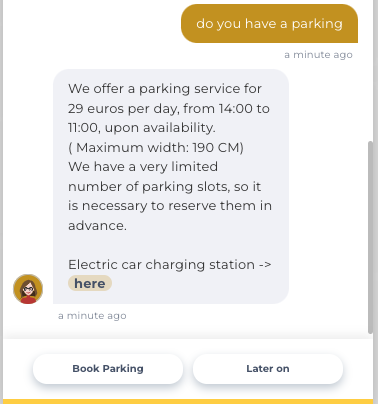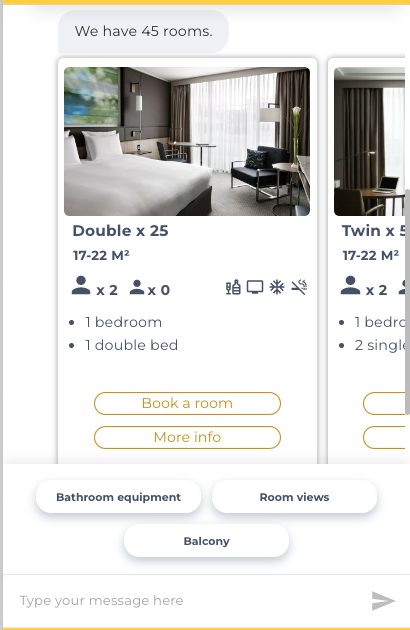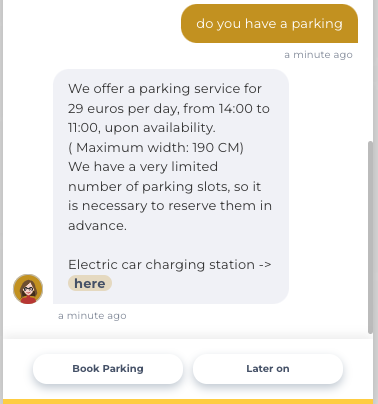Conversational AI and Generative AI
Conversational AI is a branch of AI that focuses on understanding and answering questions using natural language processing (NLP) techniques. It is designed to be able to quickly generate an answer from either a library or, when more advanced, a database. Thus if the NLP and the database are perfectly matched, as they are in the case of Velma (the conversational AI in hospitality industry of Quicktext), the level of understanding is exceptional and the positive response rate can reach a high level of over 85%.
Generative AI, on the other hand, uses neural networks to generate new and original data. It is able to create texts, images and even videos. Generative AI creates an answer based on multiple sources. Since these sources have varying degrees of reliability, the answer may be partially, or completely, wrong. Generative AI is therefore probabilistic, which is why it can say anything. In this case we can even speak of a degree of hallucination.
Learn More about Generative AI for Hotels: Q-Brain+
The two AIs applied to the hotel industry
A conversational AI such as Velma (AI hotel chatbot) draws on a database to give a precise answer. This answer will be consistently the same as long as the data in the database does not change.
- Question: What is the breakfast time at the hotel?
- Answer: Breakfast is open from 7am to 10am.
A generative AI such as ChatGPT drawing on various sources will generate a much broader answer.
- Question: What is the breakfast schedule?
- Answer: Breakfast is available from 7am to 2pm. You will discover a selection of breads and pastries from Fauchon.
In this case, the answer even includes elements which have not been requested and which can potentially be false in the answer, and the client/ traveler will have to refer to other sources, to validate relevance and accuracy.
If the source is the hotel’s website, it is likely that the information is correct. If the main sources are third party sites: OTA, tourist office, press, it will be more prudent to validate the answers given. The great danger is therefore to make false implications and even to project meaning into something that has no meaning, or is not relevant.
What about a chatbot for the hotel industry generated by generative AI?
Given the fascination with the promise of ChatGPT for hotels and its media hype, it would be tempting to run to generative AI.
The problem
However, conversational AI for hotels remains the most relevant for the following reasons:
- Disproportionate consumption of resources compared to the real benefit
Generative AI has a high financial and energy cost. Indeed, it consumes more resources than conversational AI for, sometimes, the identical result. The customer asks for the check-in time and the important thing is that he gets clear information. Indeed, most travelers’ requests are direct and simple, and the conversational AI replies directly and simply and handles them very well.
- There is no need to use generative AI in hospitality for simple queries
It makes sense that a standard AI would be able to answer a basic question like “Do you have parking? `There is no need to elaborate on the response to this question, in the first instance. In the same way that you would not need to take a plane journey to buy your daily loaf of bread, especially if the plane’s GPS is not reliable.


- Validation of answers
The generative AI will give an answer over which no one has any real control. The words and tone used may not even make sense. The generative AI does not understand what it is actually saying. It only understands statistics and strings.
- The format of the response
Generative AI gives a response principally in the form of text with often unnecessary elements added. It can therefore become lengthy and difficult to read and requires sustained attention. Whereas with conversational AI, the response has been thought through beyond text, structured, and written by a linguist who adapts it to their culture and can rely on rich content, with direct responses, images, carousels, etc.


- Best data guaranteed
The biggest mistake would be to use generative AI over which you have no control such as ChatGPT from Open AI, as all the data in your system will be given to them.
Surely it would not be in your interest to transfer all of your data to them in this way because ChatGPT will simply record your data and store it in their system. Once all of your data is ‘siphoned off’: Why would people still go directly to you/ your site, since everything is in ChatGPT? And what is to stop ChatGPT from telling you that it will now redirect customers who want to book to the highest bidder, namely Booking and Expedia for example?
So beneath the facade of Generative AI, be aware that there are companies who have one goal, and that goal is to make money. Communicate data, yes, but the basic, deep data must remain the exclusive use of the hotel’s own AI. This is why only a Proprietary Generative AI model guarantees that your data does not end up in the public domain.
Along with offering the “best price guarantee”, you will be able to communicate the “best data guarantee”.
- Privacy protection
In a chat, a user shares personal data that is sometimes sensitive and falls under the GDPR and other privacy laws around the world. Open AI, the publisher of ChatGPT does not properly inform users that it is collecting their personal data, nor does it even provide a legal basis on which to do so. The messages are stored in the US. Furthermore, the data processing agreement provided by Open AI to its users, is not compliant with GDPR.
The solution: hybridisation
The right solution is therefore to use conversational AI for what it does very well (Velma currently generates more than 85% of positive responses) and to use a proprietary generative AI that is energy efficient and respects the various privacy regulations for very specific tasks such as analyzing long texts, understanding complex questions, or verbalisation.
For example, hotel cancellation requirements can be very complicated with multiple options, and here generative AI can make sense. But the number of cases like this is quite limited.
Making good use of its data
Hotels, to date, have not mastered the data that characterizes them. Indeed, hoteliers have spent a considerable amount of time filling in Booking and Expedia’s characteristic sheets. However, as we have seen in article why you should focus more on google and less on OTAs, they are using them to compete in search results. This situation is even worse with Bing and ChatGPT. The majority of the data ChatGPT uses is structured data from Booking, Expedia, etc., not from the hotel itself for the simple reason that it doesn’t exist with this system its not a ChatGPT for hotels.
So what can hoteliers do? The solution exists the combination of Q-Data + Q-SEO from Quicktext:
- Q-Data is the Quicktext database that allows you to centralize more than 1900 data points per hotel,
- Q-SEO is the functionality in Quicktext that allows users to bring up this data in a structured and dynamic form in Google and ChatGPT.
Learn more about Q-SERVICES
Google vs ChatGPT (Google Snippets vs Bing + Chat GPT)
Google Snippets
Google’s goal is clear: not only must it provide you with the best possible answer, but it must also keep you in the Google space. With the answer clearly in the search results, there is no reason for you to click on a link to look elsewhere. Google’s results are broadly broken down as follows:
- Featured snippets,
- Sponsored results,
- Organic results (which may include classic snippets).
Bing + ChatGPT
The display is different from that of Google. Following a request, you will have two tabs:
- the first with the classic search just like Google (sponsored results and organic results),
- the second is the conversation tab with the results provided by ChatGPT. The results are not on the same page because the cost of processing ChatGPT is much higher than traditional processing, so it is economically difficult to generate its results by default.
The good news is that thanks to Q-SEO the hotel data will automatically show up in Google snippets but also in ChatGPT responses. (Screenshot).
More details on Q-SEO can be found in article SEO for hotels.


To conclude: what to do
As we have seen, it is strongly advised against using Open AI’s generative AI as the AI for your Hotel chatbot for the following reasons – it is: more expensive, bad for the environment, poor quality, unstructured, evasive, and even provides false answers and does not meet the standards of regulatory compliance. Moreover, the use of your data will end up being completely out of your control. We will have to wait until the first proprietary generative AI dedicated to the hotel industry hits the market, to start considering this option.
On the other hand, thanks to Q-SEO, the use of your basic structured data, on which ChatGPT will feed, is the winning solution. It will ensure that Bing & ChatGPT is capturing the right and necessary data which you can control (and only the data you want to communicate).
If you have to remember only one thing, let it be this: the hotel world is going to move from “best price guarantee” to “best data guarantee.” Indeed, this is already, without a doubt, the new battle between hoteliers and OTAs.


